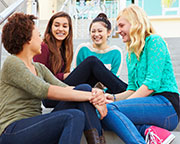- Could Your Grocery Store Meat Be Causing Recurring UTIs?
- Are You Making This Expensive Thermostat Error This Winter?
- Recognizing the Signs of Hypothyroidism
- 10 Strategies to Overcome Insomnia
- Could Artificial Sweeteners Be Aging the Brain Faster?
- Techniques for Soothing Your Nervous System
- Does the Water in Your House Smell Funny? Here’s Why
- Can a Daily Dose of Apple Cider Vinegar Actually Aid Weight Loss?
- 6 Health Beverages That Can Actually Spike Your Blood Sugar
- Treatment Options for Social Anxiety Disorder
Your Genes May Help Pick Your Friends

A person’s DNA may play a big role in who they decide to hang with, a new study suggests.
“Looking across the whole genome, we find that, on average, we are genetically similar to our friends,” study co-author James Fowler, a professor of medical genetics and political science at the University of California, San Diego, said in a university news release.
“We have more DNA in common with the people we pick as friends than we do with strangers in the same population,” he said.
In the study, Fowler’s team analyzed the genes of more than 1,900 people who were either pairs of unrelated friends or unrelated strangers.
He and his colleagues found that friends share about one percent of their genes and are as much “related” as fourth cousins or people who share great-great-great grandparents.
“One percent may not sound like much to the layperson, but to geneticists it is a significant number,” study co-author Nicholas Christakis, a professor of sociology, evolutionary biology and medicine at Yale University, said in the news release.
“And how remarkable: Most people don’t even know who their fourth cousins are! Yet we are somehow, among a myriad of possibilities, managing to select as friends the people who resemble our kin,” he added.
The researchers also developed what they call a “friendship score” that can be used to predict who will be friends. It’s about as accurate as genetic-based methods of predicting a person’s risk of obesity or schizophrenia.
The study was published July 14 in the Proceedings of the National Academy of Sciences.
More information
Mental Health America explains the importance of connecting with others.
Source: HealthDay
Copyright © 2026 HealthDay. All rights reserved.










